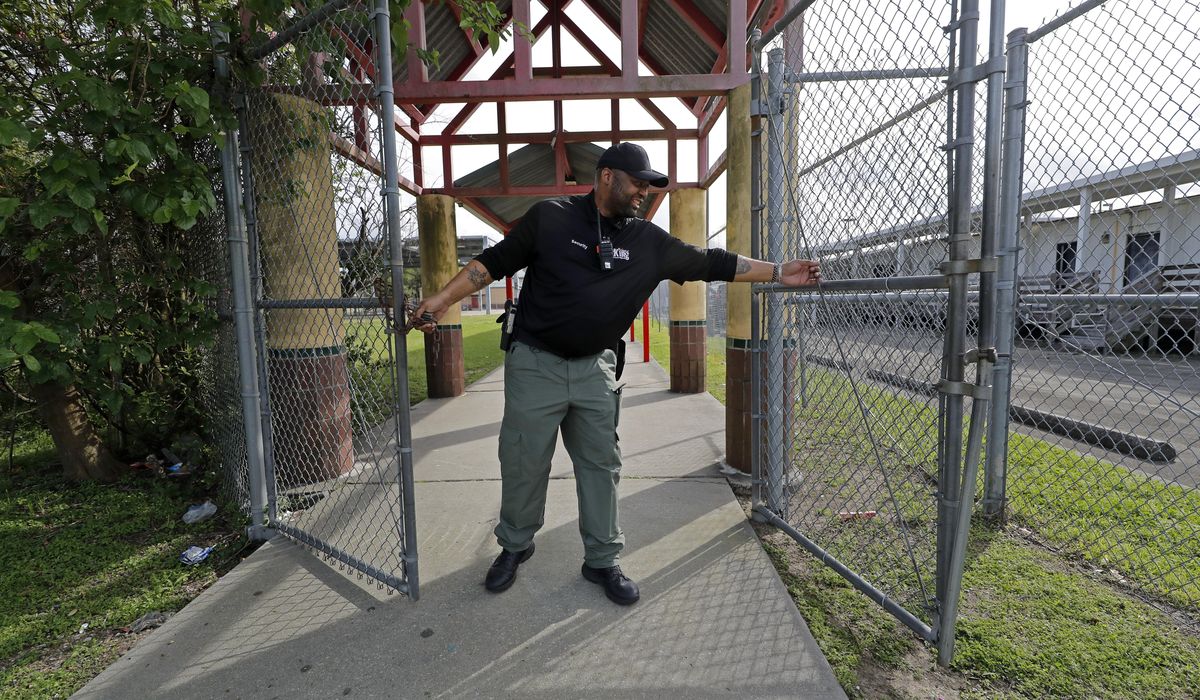
Communities across the country are rethinking their decision to remove police from school campuses amid an uptick in incidents involving students, guns and fights.
In Desert Springs, Nevada, local lawmakers who pulled police from five public high schools this year reversed their decision last month and renewed their contracts. A public outcry erupted after a student brought a knife to school and bullying, fights and gang violence increased.
In Santa Cruz, California, public school officials returned a police officer to Aptos High School last month after the fatal stabbing of a student on campus in August.
In Rochester, New York, leaders from four local education unions sent a letter last month asking public school district officials to reconsider their decision to remove police from schools. They cited recent reports of fighting, gang violence and shootings near campuses.
In the Washington area, officials in Alexandria, Virginia, backtracked last month on their decision in August to pull police from city schools after Superintendent Gregory Hutchings described “an escalation of disciplinary infractions.”
“We had a student that was shot down the street. We have a student that brought a loaded gun, almost, into our school building. We have a student that was shot this weekend as well,” Mr. Hutchings said at a City Council meeting on Oct. 13. “Those are facts. This is not anything that we’re making up.”
The cities are among dozens nationwide that reduced or removed police from schools in the aftermath of the death last year of George Floyd, a Black man who was killed by a White police officer in Minneapolis. Critics argued that putting police in schools is unnecessary and that the funding should go to other programs such as mental health services.
Mr. Hutchings, however, said the recent incidents have proved that Alexandria needs police in schools and that the city of more than 159,000 might not fit the “national narrative.”
National Police Association Betsy Brantner Smith told The Washington Times that programs placing police or “school resource officers” in schools became “one of the victims of the ridiculous ‘defund the police’ movement.”
The association, she said, believes school resource officers “throughout the nation should be reinstated and supported for the safety of not only children but for all school personnel.”
“Communities and police leaders must continue to fight the false narrative that law enforcement officers in schools are a ‘danger’ to children attending public school,” Ms. Brantner Smith said.
The retired police sergeant said officers have helped stop shootings and other crimes on campus and serve as role models and counselors for students.
The National Association of School Resource Officers reported that the number of gun-related incidents in schools from Aug. 1 to Oct. 1 more than tripled this year, from 29 to 97.
The nonprofit agreed with Ms. Brantner Smith. “Having a school resource officer in place who is actively cultivating relationships with students has prevented many incidents of school violence,” it said.
“Active shooter incidents have been disrupted before they ever started because of the work of SROs and the valuable role they play in the school safety community,” the association said.
Police in Delaware said last week that a 14-year-old boy brought a loaded gun to Smyrna Middle School but turned it over to a school resource officer. Authorities determined that the boy was having a mental health crisis and they were considering whether to press charges.
Meanwhile, officials in Montgomery County, Maryland, are sticking to their decision in August to remove police from buildings despite calling them for help in recent weeks.
Police responded to reports of gunshots near Seneca Valley High School, resulting in lockdowns and shelter-in-place orders twice last month. They also showed up when a fight broke out during a football game at the high school on Oct. 15. One student was sent to a hospital.
Monifa McKnight, interim superintendent of Montgomery County Public Schools, said last week that just “because we don’t have SROs in schools, [it] does not mean that we don’t have a relationship with the police department.”
“We have relied on our police to go out and investigate what’s going on in the community,” Ms. McKnight said during a virtual town hall. “Those examples really speak to why it’s important to continue with that relationship.”








